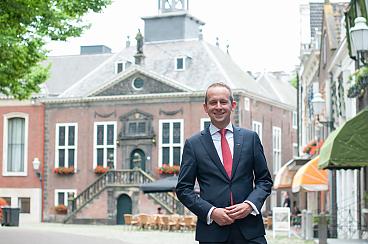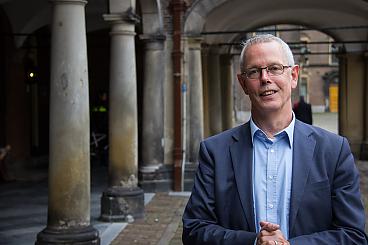Meet the SP's lead candidates for the European Parliament and the Senate
Meet the SP's lead candidates for the European Parliament and the Senate

Who will lead the SP's lists for the elections to the European Parliament and the Senate? The party's members have yet to decide whether they will accept the recommendations, but in the meantime we spoke to the lead candidates as proposed on the draft lists presented today. Arnout Hoekstra is the candidate to lead the SP list for the European Parliament and Tiny Kox the lead candidate for the Senate.
 New and old together: Arnout has never been the lead candidate for the European elections in the past, while Tiny has been a Senator since 2003 and is well-known. Arnout, could you introduce yourself?
New and old together: Arnout has never been the lead candidate for the European elections in the past, while Tiny has been a Senator since 2003 and is well-known. Arnout, could you introduce yourself?
For the last eight years I've been a member of the local authority executive in Vlaardingen. Before that I was chair of the SP group on the council. I've been a member of the SP in Vlaardingen since I was sixteen. We began as a small group of young people, but within a few months we had grown into a much larger group organising actions with other young people for better facilities. As a councillor I have also always tried as far as possible to make the voices of the neighbourhoods, of ordinary people, heard in the council and in the executive. I'll do the same in Brussels. You're not going to be seeing me spending all day in the European Parliament going from office to office with a wheelie bag.
Arnout, if the SP membership agrees, you'll soon be leading our group in the European Parliament. What do you want to change?
We need a counterbalance to the Brussels elite. Their answer to every problem is always the same: 'more Europe'. It's principally the interests of multinationals and shareholders which are taken care of. And they fail to recognise that every European country has its own culture, its own history, and has had its own social struggles. We need to return to the founding ideals of the European Union, which was established after the Second World War with the idea of cooperating to prevent conflicts. All these years later there doesn't seem to be much of this cooperation left and the Brussels elite's main activity is pushing for a European superstate. People say that we're against the EU, but that's incorrect. Socialists are internationalists. But it's true that we don't see why we should accept a superstate. We want a Europe built on the basis of cooperation between countries.
Read more about Arnout's idea on Europe.
 Tiny, you've long been a member of the Senate. Why have you decided that you'd like to lead the list again?
Tiny, you've long been a member of the Senate. Why have you decided that you'd like to lead the list again?
It would be a terrific honour to head the list again. It's hard work, but if you no longer feel the urge to want to change the world, then you might as well stay at home sitting on your couch. And that's not for me. I'm also pleased to see that someone like Arnout wants to lead the European list. That's someone who, just like myself, refuses to accept the world as it is. The SP is unique in this respect. You can read as much as you like in a book, but we're the only ones who go to the people to ask what they're thinking. Whether about Europe, the Senate, or their local council, people know very well what they want, and that what they want isn't always what they're getting. But they want to be able to put their trust in a party which allows their voices to be heard. What gives me the energy to carry on is that we can also give them hope, the hope that tomorrow will be better than today.
What do you expect from the coming elections to the Senate?
The coalition parties are pushing their plans through with the slenderest of majorities. The Senate is full of wise women and men whose task is to look at the practicality of proposals, instead of which they are now being reduced to a rubber stamp. This is an extremely sad state of affairs for democracy. The elections for the Provincial Assemblies and thus indirectly for the Senate are therefore of exceptional interest. There's a really good chance that the government will lose it's majority in the Senate, which will force the coalition parties to really listen to the Lower House* and for once come out with arguments for their proposals and in this way try to persuade other parties to support them. That would be a real democracy.
The coming months will see the draft list of candidates and the election manifestos discussed in detail with SP members in the branches throughout the country. The definitive list will be confirmed in February.
*Translator's note: The Dutch Parliament is divided into two houses. The Eerste Kamer, literally the First Chamber, also known as the Senate; and the Tweede Kamer, literally the Second Chamber, which is analogous to the House of Commons in the UK, the Dáil Éireann in Ireland, and the House of Representatives in the US. In the Netherlands the Senate is indirectly elected, based on the proportion of seats won in the Provincial Assemblies.
